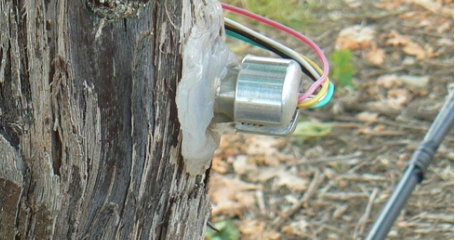A promising new sensor tool to measure grapevine water status to efficiently manage vineyard irrigation is being beta tested this year in California vineyards, and if trials are successful, a commercial sensor product will be introduced to the grower market in 2020. The sensor is a micro-tensiometer that is installed into the trunk of a grapevine to provide continuous measurement of stem water potential (SWP) with data automatically transmitted to the grower to evaluate for making irrigation decisions.
The SWP tensiometer was developed using microchip technology by a team of researchers at Cornell University in New York that included: Dr. Alan Lakso, now an emeritus professor in plant science specializing in fruit and grape crop physiology; Dr. Abraham Stroock, a faculty member in chemical and biomolecular engineering; and mechanical engineering PhD student Michael Santiago.
A 2015-16 research grant from the U.S. Department of Agriculture National Institute of Food and Agriculture helped further test and develop the technology. After completing his Ph.D. in 2016, Santiago helped found the startup company FloraPulse to license the Cornell patents and commercialize the technology. Santiago is CEO of FloraPulse based in Davis, CA and has been conducting field trials in California vineyards and orchards with the sensors since 2017.
In 2017-18, FloraPulse raised $925,000 in federal funds from Small Business Innovation Research (SBIR) grants through the National Science Foundation to develop initial prototypes for a commercial product. The purpose of the micro-tensiometer is to provide a commercial system capable of automated, accurate and long-term measurement of plant water status.
During the current 2019 growing season, beta trials are being performed in California vineyards and almond orchards. These trials will assist with improving sensor design and installation and developing a decision support system to deliver accurate irrigation recommendations for growers based on crop yield and quality goals. Santiago said the company plans to introduce a commercial product to the market in 2020 that will initially be limited to California customers.


